
The Free Church of Scotland is a Scottish denomination which was formed in 1843 by a large withdrawal from the established Church of Scotland in a schism known as the Disruption of 1843. In 1900, the vast majority of the Free Church of Scotland joined with the United Presbyterian Church of Scotland to form the United Free Church of Scotland. In 1904, the House of Lords judged that the constitutional minority that did not enter the 1900 union were entitled to the whole of the church's patrimony, the Free Church of Scotland acquiesced in the division of those assets, between itself and those who had entered the union, by a Royal Commission in 1905. Despite the late founding date, Free Church of Scotland leadership claims an unbroken succession of leaders going all the way back to the Apostles.

Robert Smith Candlish was a Scottish minister who was a leading figure in the Disruption of 1843. He served for many years in both St. George's Church and St George's Free Church on Charlotte Square in Edinburgh's New Town.
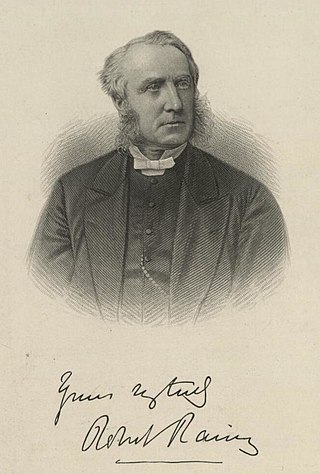
Robert Rainy, was a Scottish Presbyterian divine. Rainy Hall in New College, Edinburgh is named after him.

William Lindsay Alexander FRSE LLD was a Scottish church leader.

Sir George Adam Smith was a Scottish theologian. He was the Principal of the University of Aberdeen between 1909 and 1935 and an important figure in the United Free Church of Scotland.
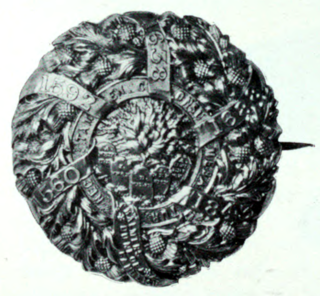
The Disruption of 1843, also known as the Great Disruption, was a schism in 1843 in which 450 evangelical ministers broke away from the Church of Scotland to form the Free Church of Scotland. The main conflict was over whether the Church of Scotland or the British Government had the power to control clerical positions and benefits. The Disruption came at the end of a bitter conflict within the Church of Scotland, and had major effects in the church and upon Scottish civic life.

New College is a historic building at the University of Edinburgh which houses the university's School of Divinity. It is one of the largest and most renowned centres for studies in Theology and Religious Studies in the United Kingdom. Students in M.A., M.Th. and Ph.D. degree programmes come from over 30 countries, and are taught by almost 40 full-time members of the academic staff. New College is situated on The Mound in the north of Edinburgh's Old Town.

Knox College is a postgraduate theological college of the University of Toronto in Toronto, Ontario, Canada. It was founded in 1844 as part of a schism movement in the Church of Scotland following the Disruption of 1843. Knox is affiliated with the Presbyterian Church in Canada and confers doctoral degrees as a member school of the Toronto School of Theology.
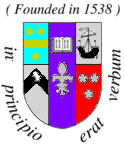
St Mary's College, founded as New College or College of the Assumption of the Blessed Virgin Mary, is the home of the Faculty and School of Divinity within the University of St Andrews, in Fife, Scotland.
George McLeod Newlands is a Scottish theologian widely published in the fields of modern systematic theology, Christology, emancipatory theology, and the history of Christian thought. He is Emeritus Professor of Divinity at the University of Glasgow, and served as Chair of the Theology, Divinity & Religious Studies panel of the UK's 2008 Research Assessment Exercise and as President of the Society for the Study of Theology for 2013–14.
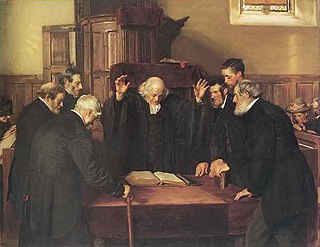
A Church of Scotland congregation is led by its minister and elders. Both of these terms are also used in other Christian denominations: see Minister (Christianity) and Elder (Christianity). This article discusses the specific understanding of their roles and functions in the Scottish Church.

Old College is a late 18th-century to early 19th-century building of the University of Edinburgh, Scotland. It is located on South Bridge, and presently houses parts of the University's administration, the University of Edinburgh School of Law, and the Talbot Rice Gallery.

Christ's College was one of three colleges in Scotland founded by the Free Church of Scotland for the training of ministers following the Disruption of 1843. The other two were New College, Edinburgh and Trinity College, Glasgow.
James Denney was a Scottish theologian and preacher. He is probably best known today for his theological articulation of the meaning of the atonement within Christian theology, atonement for him being “the most profound of all truths”. Many have misunderstood his position, arguing that he was known for his defense of the doctrine of penal substitution. However, Denney himself protested vigorously against this characterization.

William Arnot (1808–1875) was a Scottish minister and theological writer. He served in the Church of Scotland but moved to the Free Church of Scotland at the Disruption of 1843.

Thomas Martin Lindsay FRSE (1843–1914) was a Scottish historian, professor and principal of the Free Church College, Glasgow. He wrote chiefly on church history, his major works including Luther and the German Reformation (1900), and A History of the Reformation (1906–1907).
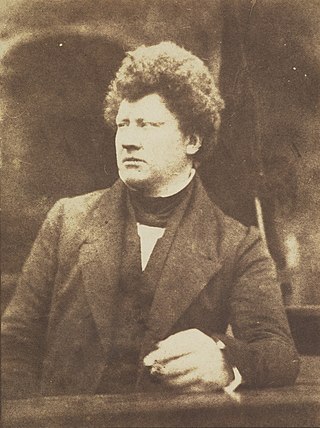
William Cunningham was a Scottish theologian and co-founder of the Free Church of Scotland. He was Moderator of the Free Church in 1859.
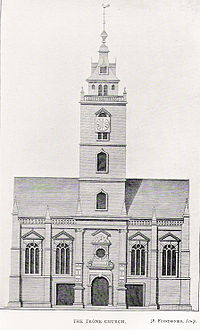
John Drysdale FRSE was twice Moderator of the General Assembly of the Church of Scotland, both in 1773 and in 1784. He was Dean of the Chapel Royal in Scotland 1766 to 1788, and Chaplain in Ordinary to George III. He was brother-in-law to Robert Adam and father-in-law to Andrew Dalzell.

James Henderson was a Scottish minister of the Free Church of Scotland who served as Moderator of the General Assembly to the Free Church 1855/56.



















